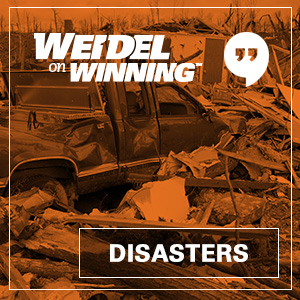A thousand-year rainstorm hit Denver last week. Roads and bridges, gone. Not damaged, but gone – forever. Thousands of homes obliterated. They’ve had massive snowstorms, and they’ve had massive fires. But never a flood. And now after the flood waters have receded, they found a parting gift: massive mildew.
It was a total surprise. No one saw it coming, but that’s just the way disasters are – unpredictable. Unfortunately, sooner or later they happen to everyone, in one form or another. It’s part of living.
When are they most likely to happen?
It’s like this: when is your house likely to burn? The day after you let your fire insurance lapse, or the day before you were going to get some. That’s when disaster strikes—at the worst possible time.
So what’s the way to protect yourself?
Prepare before it comes; before it’s too late. You can’t protect yourself against them all, so you do the best you can. You don’t have to go through life in a constant state of paranoia, becoming a doomsday prepper. But on the other hand, you don’t want to live like an ostrich with your head in the sand, ignoring all possible dangers in your environment.
So how can you find a balance? Just keep your eyes open. When you see a vulnerability, take a reasonable step to minimize the danger. At least do the obvious things; the things most people know to do but just neglect to do.
Here are some obvious and simple steps you can take.
Don’t
- Spend all your money – keep a buffer
- Buy a house on a cliff where they have mudslides and earthquakes
- Spend a lot of time out late at night in dangerous parts of town
- Let your kids play in the ocean when they are having riptides
- Associate with problem people, and don’t let your teenagers do it either
- Build your life around expensive hobbies
- Have a lot of secrets; hidden things, when revealed, can destroy lives
- Ignore danger signs and warning clouds
- Neglect little problems and let them blossom into nightmares
Do
- Live beneath your means, and pay your taxes
- Protect yourself with term insurance, mutual funds and sufficient auto and home insurance
- Spend your time in positive environments
- Make sure your kids are in positive schools and have positive teachers
- Invest time to build and maintain strong relationships with family and friends
- Spend time building strong spiritual values and knowledge of the scripture
- Buy a home in a community that is desirable, stable, with the likelihood of appreciating in value
This isn’t rocket science, and it doesn’t require a genius I.Q. or a lot of effort – it’s just being smart.


